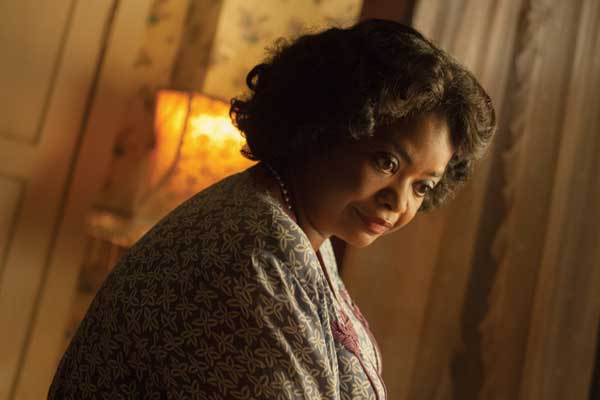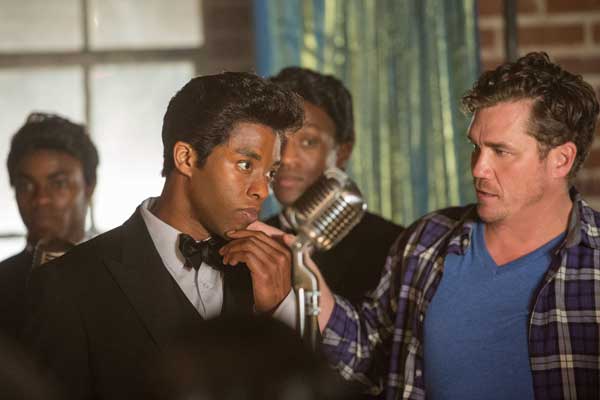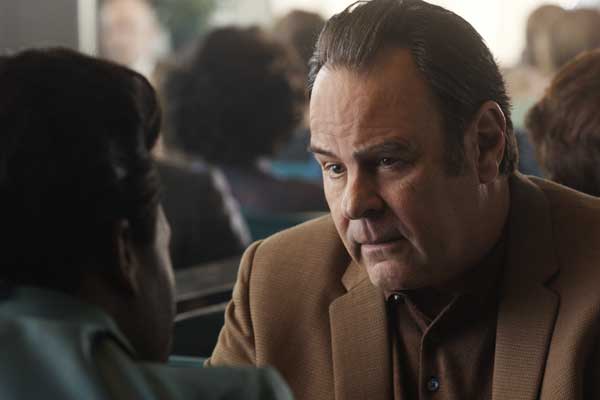GET ON UP Cast & Mick Jagger Talk James Brown Biopic
- Details
- Category: Interviews
- Created: Wednesday, 30 July 2014 12:51
- Published: Wednesday, 30 July 2014 14:31
- Written by Lupe R Haas
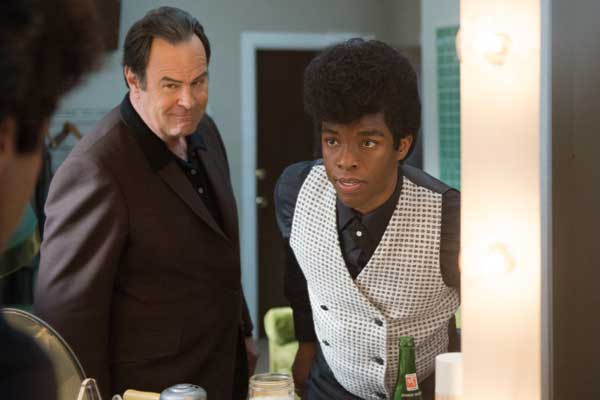
GET ON UP is an admirable departure from the traditional music biopic. Directed by Tate Tayor ("The Help"), the film doesn't simply chronicle the life of James Brown, it presents an artfully constructed narrative that reads like a stream of consciousness. Alluring performance sequences are intercut with haunting recollections from his childhood.
Chadwick Boseman ("42", "Draft Day") portrays the legendary soul singer and effectively captures Brown's striking presence and the emotional turmoil he endures. Rounding out the remarkable cast are Dan Aykroyd, Octavia Spencer, Jill Scott and Nelson Ellis--all of whom attended the NY press conference for the film. They joined Taylor and producers Mick Jagger and Brian Grazier-- to discuss Brown's music and their personal connections to the film.
Q: You were involved in this film for a long time, tell us what it was like to work on the movie, and to partner with Mick Jagger on it.
Brian Grazer: Working with Mick Jagger is one of the greatest thrills of my life. I read James Brown, or Mr. Brown 16 years ago and just in like an interesting people journey that I do as a discipline and I thought this would be an amazing film to make a movie about James Brown and I transitioned from that point to convincing James Brown that I should make his life story into a movie, and then own the rights for about 12 years, and in the 12 years I would have to renew the rights, let James Brown direct me, hire different screenwriters, once upon a time a different director, but it was a long, tedious, arduous process, and when James Brown died I lost the rights, because the rights became even further complicated. And a year later, Mick and I had an opportunity to read the script, and he ended up with the rights, and we would do it together and it's just been a fantastic process.
Mick Jagger: Sounds rather arduous. It was much easier for me than Brian. Brian did all this work in the long distant past, and obviously it was very complex. It was simpler for me because I was asked by a business associate and friend Peter Afterman if I would make a documentary about James Brown. I woke up and said, 'lets do a feature,' but of course being in Hollywood there's always a feature. Brian and I and slightly later on (Director) Tate (Taylor) had to convince the studio that this was a movie that should be made. It was a really good experience for me.
Then I learned of the script and I learned of Brian's previous involvement, so that's the short version of how I got involved. Actually, in Hollywood terms, from the beginning of my involvement to this point of having the premiere of the movie on august first, it's been a relatively short time. Since we started on the second part of the journey, Brian had done all this hard work in the beginning, but since we started the second part of the journey, in hollywood terms its been really quick.
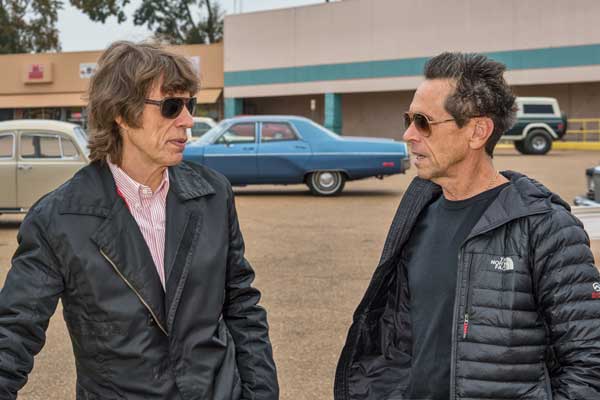
Q: Being that James had an entrepreneurial spirit what is one business that James had created that surprised you both?
Chadwick Boseman: The most surprising venture was the James brown fruit stand,. I don't know if you all know about that one. It was part of him wanting to recycle money within the black community before it goes outside of the community; to build. It actually was a genius idea. It obviously is not still around, but that was the thing that was the most surprising for me.
Dan Aykroyd: I would say nothing that James did entrepreneurially would surprise me. He was just so broad ranging in terms of his understanding of business, how to handle people, how to handle money, how to balance a book, how to make a tour more profitable than any other artist, and he extended it into the radio stations and the merchandising. He just got it, and he got it from a very early age.
Q: Octavia, your character is one of the only people in James' life who really stood by him and believed in him. Did you channel anyone in your life as a young artist to get into that character and why did you want to tell this story?
Octavia Spencer: There was very little channeling that needed to take place in order to understand what she was providing for him. James Brown was definitely a music icon and for those of us who are barely forty, that would be all of us. There was so much about the man in front of the music that I knew, that I realized when the whole idea about him, I knew so little about him as a person. We know how the story ends, but not perhaps how it began and maybe a little bit of the middle that I was really intrigued by that and the fact that you have this icon in Mick Jagger, this icon in Brian Grazer, and the genius of Tate Taylor, that I really had to muscle my way in there.
Q: Mr. Jagger, can I ask you about your personal recount when you followed James Brown, how that played out and how did this experience influence you as a performer?Jagger: My recall of it it's about 50 years ago. My recall of it is not perfect. Will you forgive me. But it was a very exciting show. James Brown was at the underneath the stars show but there were many people at the show that were interesting to me, for the first time. I'd never met Marvin Gaye before, for instance. I got the opportunity to chat with him. There was a lot of us on the show. It was a pretty crazy day. I'd seen James Brown before on time, at the Apollo, and the experience was James was a bit annoyed about not being the last on the show, and as I was the only one that met him before, of all the people working on the show, including the producers of the show, whoever the were. I have no idea who they were. I was the fall guy, because I was like 20 or something so they said “you go talk to him, you know him, you go call him out”. And when you're 20 you say “sure”. Now it's, “that's not my job, that's your job”. When you're 20 you go, “sure”. Of course it didn't work. It might have somewhat assuaged him, but it played out and it was what it was. He did this amazing performance and we went on after, but in the end I don't think it really mattered. We had to work harder, and he worked harder, and maybe it was a better show because of it.
Q: How do you go on after that? Did it influence your stage performance?
Jagger: He influenced me a lot. Amongst a lot of other people, he influenced me in lots of ways. I could never do the dance routines like James, and I never spent the time and effort that Chad had to do to do the fantastic job that he does in this movie of doing that, because I didn't want to be an imitator of that. But the thing about him that impressed me, as with other people that I was influenced by at the time, little Richard being the other one, who is in this movie as well. Both of them from very similar parts of the world, and that, how to interact with an audience, the most important thing. And i'm sure that Chad got into some of that into making of this movie because it's all about, James was all about interacting with the audience, it wasn't just your performance. It's about their performance too. It's about how they perform and they react and you react to them, the interplay.
Q: Ms. Boseman. Were there any challenges in portraying Mr. Brown?
Chadwick Boseman: the entire thing was a challenge. When I looked at the role, the reason I was a bit, I was scared, was there was no part of it that was just straight-forward, easy, you've done that before. A lot of people will say “where your from, South Carolina” but he's from the low country of south carolina, it's different. It's not the same thing. And i've spent quite a bit of time out of South Carolina, so it was important to me, we went down to Augusta to meet the family, and stayed because augusta is pretty much on the border, between georgia and south carolina, I stayed down there a little bit longer, and just drove around, saw the family and soaked up as much of it as I could before we started. This was right before we started. There was no part that was easy to do. 60% of my fear was from the dancing. 30% was just the caricatures that have been projected of him and trying to get past what people think they know, but I don't think there was any easy part.
James Brown wanted you to have that experience, of seeing him in all his glory. It is definitely a connection you want to have with people. This is what I took away from doing this role.
Q: What is your earliest memory of Brown's music?
Taylor: For me instead of one song, it brings a memory. I primarily lived with my mother and she loved James Brown. He was on her record player a lot as a child and it shaped me. When we started filming the movie she brought me all her James Brown records, and I had forgotten that she used to play them for me. And it made me think of her challenges and James' challenges and it was kind of cool that she listened to his music. All of the songs are my favorite for that reason.
I can't speak the words of music. I always feel embarrassed when people ask me questions about music. What I love is that Brown did not talk music. He didn't read music and he spoke about music for what feels good. And he would explain emotionally to his band and utter sounds and say do this and that. That's what makes his music so unique, because it came from the heart and feeling, and it may not have been profoundly articulated or said in the ways that musicians understood, but it made it accessible for me. It made me realize that anyone could do something if they feel it.
Scott: Mine would be, "I'm black and I'm Proud." I remember something in me stood a little bit higher, I puffed my chest out when listening to that song.
Jagger: The ‘Live At the Apollo’ Album was my kind of real introduction into James Brown, I loved every tune in it.
Aykroyd: 1968. Montreal, Canada. The building is gone now, but it was called the Esquire Show Bar. You sat at the bar and the performers danced along the bar. So when Danny Ray came out and they dropped the cape on James Brown and he did "Please, Please, Please," that was a seminal moment for myself and my six friends who’d squeezed into our friend’s mother’s Mustang and come down from Ottawa to see this show.
Q: You and Chad have such a great dynamic on-screen, how did you both prepare for your scenes together?
Aykroyd: We took a road trip. We drove out to some mansion [in Mississippi]. You get on a set and you’re in it together. You face yourself and you’re there with the director in the common environment of creativity. You do the work. But it’s not hard to love Chad. He’s just an enormously likable and extremely talented man. My affection in real life for him translates into the movie. I think you can see it. Because Pop really loved James Brown. They had a great friendship.
